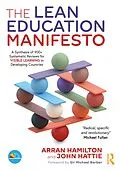The global expansion of education is one of the greatest successes of the modern era. More children have access to schooling and leave with higher levels of learning than at any time in history. However, 250 million+ children in developing countries are still not in school, and 600 million+ attend but get little out of it - a situation further exacerbated by the dislocations from COVID-19.
In a context where education funding is stagnating and even declining, Arran Hamilton and John Hattie suggest that we need to start thinking Lean and explicitly look for ways of unlocking more from less. Drawing on data from 900+ systematic reviews of 53,000+ research studies - from the perspective of efficiency of impact - they controversially suggest that for low- and middle-income countries:
- Maybe pre-service initial teacher training programs could be significantly shortened and perhaps even stopped
- Maybe teachers need not have degree-level qualifications in the subjects they teach, and they might not really need degrees at all!
- Maybe the hours per week and years of schooling that each child receives could be significantly reduced, or at least not increased
- Maybe learners can be taught more effectively and less resource intensively in mixed-age classrooms, with peers tutoring one another
- Maybe different approaches to curriculum, instruction, and the length of the school day might be more cost-effective ways of driving up student achievement than hiring extra teachers, reducing class sizes, or building more classrooms
- Maybe school-based management, public-private partnerships, and performance-related pay are blind and expensive alleys that have limited influence or impact on what teachers actually do in classrooms.
This groundbreaking and thought-provoking work also identifies a range of initiatives that are worth starting. It introduces the Leaning to G.O.L.D. methodology to support school and system leaders in selecting, implementing, and scaling those high-probability initiatives; and to rigorously de-implement those to be stopped. It is essential reading for anyone with an interest in education.
Autorentext
Dr Arran Hamilton is Group Director of Education at Cognition Education. Previously, he has held senior positions at Cambridge University Press & Assessment (formerly Cambridge Assessment), Education Development Trust, the British Council, and a research fellowship at Warwick University.
Professor John Hattie is Emeritus Laureate Professor at the Melbourne Graduate School of Education at the University of Melbourne, co-Director of the Hattie Family Foundation, and chair of the Board of the Australian Institute for Teaching and School Leadership.
Inhalt
Foreword
Sir Michael Barber
Introduction
Part One: Scene Setting
Chapter 1 The Global Massification of Education
Chapter 2 We Need to Get Lean
Chapter 3 Reviewing the Existing Research on 'what works best' for Education in Developing Countries
Chapter 4 The Visible Learning METAX Stop-gap
Part Two: Warm Leads and Blind Alleys
Chapter 5 Returns from Teacher Selection and Training
Chapter 6 Returns from Structural Enhancements to School Systems
Chapter 7 Returns from Teacher Accountability and Motivation Enhancement
Chapter 8 Returns from High Impact Teaching and Learning Approaches
Chapter 9 Returns from Education Technology
Part Three: Evidence into Action
Chapter 10 From Provocation to Implementation
Chapter 11 Leaning to G.O.L.D.
Chapter 12 Conclusions
Appendix: High-Level Summary of 57 Developing Country 'what works best' for Education Systematic Reviews
